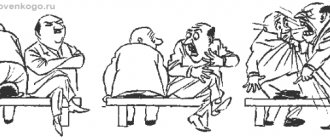Temperament is a set of mental and physiological traits of a person that determine the nature of his reactions to external stimuli. The latter includes everything around us: other people, animals, events, circumstances, etc.
In the Unified State Examination in social studies, temperament is a headache for all test takers. True, they do not realize this, but understand only after passing the exam. To avoid having your scores lowered on this topic, you need to clearly understand what temperament is? In this article, briefly and in simple words, we’ll talk about just that!
By the way, before reading this article, I recommend the articles: what is personality and about the concept of individuality, human personality.
Currently, science has moved from studying types of temperament to studying its properties. The selection of properties is carried out on the basis of criteria, signs of temperament (V.M. Rusalov):
1) temperament expresses the formal-dynamic nature of behavior (it is not related to the content of the activity and determines the dynamics of the activity);
2) temperament is associated with biological substructures;
3) it is genetically determined, primary;
4) manifests itself early in childhood;
5) temperament is ontogenetically stable, that is, it is stable over certain periods of time. It is the result of development, not education;
6) temperament is cross-situational, that is, it manifests itself in a wide class of situations. It can be studied in various activities;
7) temperament manifests itself more clearly in the most difficult conditions for a person.
Temperament properties are inherent in all people, but with varying degrees of development. In modern psychology, 8 properties are distinguished (BC Merlin, B.M. Teplov, V.D. Nebylitsin): sensitivity, activity, reactivity, balance of activity and reactivity, rate of mental reactions, plasticity-rigidity, emotional excitability, extraversion-introversion.
Sensitivity is a general persistent feature of the nervous system and analyzers, which is expressed in general sensitivity (excitability of attention). It is determined by the strength of the external influence that causes a mental reaction (high sensitivity of the senses, as well as high sensitivity to ongoing events - empathy, anxiety, vulnerability. High sensitivity in melancholic people.
Activity – the degree of energetic influence on the outside world, overcoming obstacles (volitional component). High activity in choleric, sanguine and phlegmatic people and low in melancholic people.
Reactivity – impulsiveness, involuntary movements, reactions to external and internal influences. Manifests itself in the pace, strength and form of response to events. High reactivity in choleric and sanguine people and low in phlegmatic and melancholic people.
The balance of activity and reactivity is determined by what human activity is more dependent on: random, external (mood, random events, etc.) or internal (determination, beliefs, etc.) factors. Sanguine and phlegmatic people are balanced, while choleric and melancholic people are unbalanced.
The pace of mental reactions is the speed of mental processes (movements, speech, perception, etc.). The tempo is high for choleric and sanguine people, low for phlegmatic and melancholic people.
Plasticity - rigidity - the degree of adaptation of a person to changing circumstances and activities.
Plasticity – flexibility, ease of adaptation to new conditions. Sanguine and choleric people are plastic.
Rigidity (lat. rigiditas - hardness) - inertia, inertia in adapting to new conditions, insensitivity to their changes. Phlegmatic and melancholic people are rigid.
Emotional excitability is the reaction time to emotionally significant and neutral stimuli. How weak influences are necessary for the emergence of emotions and the speed of their occurrence. Emotional excitability is high in melancholic and choleric people, low in sanguine and phlegmatic people.
Extraversion-introversion is the direction of mental activity outward or inward.
Extroversion is an individual personality trait, manifested in the predominant focus of consciousness on the world around us, in increased sociability, initiative, social adaptability, interest in other people, and openness of the inner world. Extroverts are choleric and sanguine.
Introversion is a person’s focus on himself, on his inner world, on his own actions, actions, experiences and thoughts. It manifests itself in unsociability, isolation, lack of interest in others and a tendency to in-depth introspection. Introversion is one of the basic personality traits. Introverts are phlegmatic and melancholic.
Human Temperament - Definition
Temperament
- this is a stable set of individual psychophysical properties of a person associated not with the content, but with the dynamic aspects of activity.
Simply put, temperament refers to a person’s ability to react to external stimuli and move from one reaction to another. Temperament is determined by the type of higher nervous activity, which consists of three components - the “strength” of the nervous system, its “mobility” and “balance”.
Today, the theory of temperaments is only one of many systems that describe the types of human personality. And once upon a time it was the only such system. The doctrine of them was developed by the ancient doctors Hippocrates and Galen, who were confident that a person’s character type depends on the predominance of one or another “vital juice” in his body - blood, lymph, yellow and black bile. And the word “temperament” itself, translated from Latin, means “mixture” - it meant a mixture of these “vital juices”.
Mental properties of personality temperament
Today in psychology, despite the fact that temperament is one of the oldest terms, its clear definition does not exist. Therefore, depending on theories, diagnostics of temperament properties, various studies, psychologists at different times gave completely different definitions.
If the psyche is a certain property of the nervous system, then the individual (personal) properties of a person, including the properties of temperament, are determined by the individual (personal) properties of the nervous system. They can be judged only by the subjective characteristics of nervous activity.
According to Pavlov, the subjective characteristics of various phasic (temporary) conditioned reflexes are indicators of certain properties of the nervous system. He characterized the general typology of the nervous system according to certain combinations of these properties. Therefore, the correlation of individual mental properties with the subjective characteristics of phasic (temporary) reflexes is one of the most reliable distinctive signs of temperament properties. However, this does not mean that the correlation of mental properties with any other subjective characteristics of nervous activity does not relate to the mental properties of a person’s temperament.
Now a relationship has been discovered between subjective mental properties not only with phasic conditioned reflexes, but also with conditioned tonic reflexes. Such features also manifest the subjective properties of the nervous system, and therefore the mental properties of the individual interacting with them also determine the properties of temperament.
Since the properties of any system depend on all the properties of the human body as a whole, it is logical to assume that the properties of temperament depend on all the properties of the human body. However, such a dependence is more indirect, indirect in nature, while the dependence of temperament directly on the properties of the nervous system is direct.
The same mobile features of mental activity depend on will and emotions. That is why they are ultimately determined by the relationship between the volitional and emotional characteristics of the individual. It is this relationship that underlies the characteristic features of the concept of temperament. Consequently, we can conclude that the subjective characteristics of the emotional-volitional sphere express the properties of temperament.
Due to the fact that temperament is determined by the general typology of the nervous system, its psychological signs can only be subjective characteristics of the emotional-volitional area, which are characterized by stability, constancy and persist throughout a long part of life. It is the individual characteristics that dynamically occur in emotional and volitional processes from early childhood and persist for a long time that belong to the mental properties of temperament. For example, anxiety states that are first identified in early childhood can persist into later life, until adulthood.
The basic properties of temperament can not only determine the dynamism of mental activity, but also determine the dynamism of individual mental processes. For example, stability and strength of emotions characterize the dynamism of emotional processes, and extraversion and introversion determine not only the dynamism of emotional processes, but also the dynamism of intellectual processes. Character traits, motives and relationships, although they determine the dynamism of the psyche as a whole, do not determine the dynamism of the properties of individual mental processes, but the behavior and actions of a person depending on the situation.
An experimental study of the properties of temperament has shown that formal criteria, such as sensory thresholds of perception, the speed of formation of a conditioned reflex, accuracy and speed of execution, are the main characteristics by which extroverts differ from introverts.
Properties of the nervous system and temperament
The properties of temperament in psychology are not absolutely unchanged. They do not begin to appear from birth, not all at once, but develop gradually according to a specific sequence, which is determined by both the general laws of the formation of nervous activity and the specific characteristics of a certain type or type of nervous system.
The reason for the personal characteristics of an individual’s behavior lies in the properties of nervous processes, such as inhibition and excitation, and in their various combinations. Pavlov considered fundamental three categories of nervous processes that predetermine the typology of nervous activity or system. These include: the strength of manifestations of processes, balance and mobility of manifestations. Strength is a measure of the nervous system's ability to tolerate strong stimuli. Balance shows the relationship between two processes - inhibition and excitation. Mobility is an indicator of the rate of change of two processes - inhibition and excitation.
The properties of nervous systems can be particular or partial and general. The former show private, personal special characteristics, the latter determine the characteristics of an individual’s temperament.
The physiological basis of temperament is the interaction of two signaling systems with the cerebral subcortex, and not the activity of the cortex itself. Additional properties of the system have also been identified. These include: lability, dynamism, concentration. Lability is characterized by the speed of occurrence and the direct course of two processes - inhibition and excitation. Dynamism is characterized by the speed and ease of development of reflexes. Concentration is an indicator of the boundaries of differentiation of stimuli. In the course of numerous studies, the presence of a relationship was revealed, characterized by a significant dependence of the properties of temperament on the dominant properties of mental activity. It was also revealed that the properties of temperament, which are based on the types of nervous systems, are more stable and constant in comparison with other characteristics of the psyche of individuals.
According to I.P. Pavlov, the personal characteristics of the subject’s behavior and the dynamics of mental activity depend on individual differences in the functioning of the nervous system. Psychologists have long established the fact that weakness of the nervous systems is not a negative property. The body is simply designed in such a way that stronger nervous systems cope more successfully with certain life problems, and weaker ones - with others. The advantage of a weak nervous system is its high sensitivity. In order to study the properties of nervous systems, it is necessary to study them, taking into account all the features of behavior and actions of people in various life situations.
Summarizing the above, it should be concluded that the subject’s existing complex of personal typological characteristics of his nervous structures mainly determines temperament, on which the personal style of behavior, as well as activity in general, subsequently depends. Any characteristic of the nervous system has a certain number of manifestations, each of which is not unequivocally assessed as either beneficial or harmful. Depending on the nature of the activity performed or the situation, any of these manifestations can be unfavorable and favorable.
Melancholic - characteristics: pros and cons of melancholic
Choleric at work
The main disadvantages of a choleric person include:
- Excessive haste in your actions and actions;
- Cholerics are not patient;
- Excessive impulsiveness and imbalance;
- Excessive straightforwardness and harshness when communicating with other people;
- Aggression that occurs periodically;
Psychologists recommend that choleric people learn to work on themselves. This work should include the ability to control oneself in any conflict situations. Often choleric people make rash decisions and literally throw themselves into the pool headlong. The ten-second tactic suits them, which consists of mentally counting to ten before making an important decision or expressing an opinion.
Types of temperament and character in psychology and business
In addition to the classical system of dividing temperaments, there is another one, which is often used in business. With its help, you can form a team that will successfully achieve your goals.
“Depending on their temperament, people are assigned a certain color,” notes Maria Roshchina. “Based on your color, you can judge what type of activity is ideal for you.”
- Yellow . People of this color are called interested. They are kind, friendly, caring. They are often characterized by shockingness and a penchant for creativity. In a team, they become the “sun” to which everyone else is drawn.
- Blue . Such people know how to work and relax. They have excellent analytical skills, so they quickly find errors and can direct the project work in the right direction. In their free time, they are true party people, they easily switch their attention from office routine to relaxation and know how to relax.
- Reds . These are born leaders, ready to go above and beyond and move any project forward like a powerful locomotive. They are aggressive in their work and decisions, and are often not inclined to listen to other people’s opinions, since they always know what is best, what is right and what to do next.
- Greens . In the team they may be considered nerds and quietly laugh at them. But no one will doubt their value as employees. These are excellent performers, diligent, always finishing everything. At the same time, they are non-conflict, kind and responsive, and therefore are able to win over anyone.
“When creating a team, put the “red” at the head,” advises psychologist-coach Maria Roshchina. “He will move forward like a locomotive and will take the team to a new level. Then it’s the Blues’ turn. Several of these employees will analyze and find mistakes made by the “red” ones and will not allow the project to go off the intended “rails”. “Yellow” is also needed, this is the “firefly” in the team to which everyone is drawn. He plays the role of a motivator. And recruit as many “green” — diligent performers — as possible. This way, your team will be properly staffed and produce results.”
pixabay.com/











